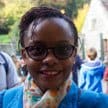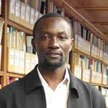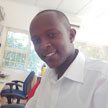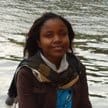Profile
Christina Obiero
Candidate CV questions (extra)
-
Education:
Johns Hopkins Bloomberg School of Public Health; University of Nairobi
-
Qualifications:
Bachelor of Medicine and Bachelor of Sugery (MBChB), Master of Public Health (MPH)
-
Work History:
KEMRI-CDC; Aga Khan University Hospital; Machakos County Hospital
-
Current Job:
I am a clinical research officer leading a vaccine study here in Kilifi County, Kenya.
-
Employer:
Kenya Medical Research Institute-Wellcome Trust Research Programme, Kilifi
-
Favourite thing to do in my job: I enjoy planning a research study from scratch. This involves thinking about how long the study will take, how many people will be involved in the study and what their different roles will be, and budgeting and purchasing the materials and tools required to conduct the study. I also enjoy analyzing data obtained from research activities as the results obtained are important in understanding whether or not the scientist met his/her objectives while conducting research.
-
My work
I am a medical doctor leading an interesting research study that is testing the safety and the body’s immune response to a vaccine that has been developed to prevent people from acquiring diarrhoeal disease in developing countries.
-
Read more
I am a medical doctor leading an interesting research study that is testing the safety of a vaccine aimed at preventing diarrheal disease. The vaccine has been developed to specifically target a group of bacteria called Shigella sonnei that can cause disease if an individual eats or drinks contaminated food or water. The bacteria can also be spread from food handlers working in restaurants to healthy people. Other symptoms of infection by this group of bacteria include vomiting, fever and abdominal pain. Most antibiotics that are used to treat this infection have over time been found not to work as well as they did previously because the bacteria has been developing resistance to these drugs. As a result of this, some patients who are put on treatment may not recover well and end up developing serious complications of infection. It is therefore necessary to develop a vaccine that can be given to healthy people in order to prevent them from getting infected. Currently, there is no vaccine that has been licensed and is available to protect people against infection. The study is also trying to find out how the human body responds to vaccination.
We are giving two doses of the vaccine to healthy adult volunteers and following them up both at home and in the clinic to look for any side effects that may occur after vaccination. We are monitoring the safety of the vaccine by finding out from the study participants if they experience any symptoms after vaccination such as headache, fever, muscle ache, fatigue, etc. We also conduct a medical examination and take blood and urine samples to check white and red cell blood counts, hemoglobin level, platelet count, liver function tests (liver enzymes and protein level), kidney function tests (levels of sodium, potassium and other parameters), and urine analysis. The body’s immune response to vaccination is tested by measuring the level of antibodies produced after vaccination and comparing this to the baseline antibody level before vaccination. Results obtained from this study will guide future studies that may be done in young children who are most at risk to diarrheal disease.
I am also working in a separate study that is trying to find out the causes of infection in newborn babies aged less than 28 days old admitted to Kilifi County Hospital. In order to do this, we are testing the blood samples obtained from newborn babies using modern techniques (called TaqMan Array Polymerase Chain Reaction technology). We are looking for bacterial and viral causes of infection in babies.
-
My Typical Day
Be at the office by 8am, read and respond to emails, review the planned activities for the day with the study coordinator, then head to the study clinic to attend to study participants and perform procedures as required for each visit.
-
Read more
I wake up early, go for aerobics at 6am for one hour, head back home to get ready for work and arrive at the office by 8 am. I then check and respond to emails, review the planned activities for the day with the study coordinator, then head to the study clinic where I attend to study participants and perform procedures depending on the visits and the study protocol e.g. consenting and screening (medical history taking and examination, measurement of blood pressure and temperature, determination of body mass index based on body weight and height, obtaining blood and urine samples for testing) of volunteers interested in joining the study, review of laboratory results and determining whether or not study participants are fit to receive the vaccine, overseeing data collection and entry into the computerized database, management of sick participants, post-vaccination assessment of participant including checking the injection site for any pain, swelling and other general reactions such as fever, tiredness and headache.
In addition to performing clinical duties and ensuring that the study is done according to the study protocol and ethical requirements, I undertake data analysis for other projects I am involved in.
I also attend to sick children admitted to Kilifi County Hospital and interesting procedures such as exchange transfusions which are done to newborn babies who develop jaundice (yellowness of the skin and eyes) during the first days of life. The causes of jaundice are many and include high breakdown of red blood cells resulting in high levels of bilirubin (which appears as the yellow color when bound to skin and the sclera in the eye). When the bilirubin levels are very high they can be transported to the brain via blood and cause brain damage. It is therefore important to perform and exchange transfusion in babies with high bilirubin levels (very yellow babies) as this is a life saving procedure. An exchange transfusion is done by inserting a tube to a vein through the baby’s umbilicus then exchanging the baby’s blood with freshly donated and screened blood. This is done by removing about 10-20ml of the baby’s blood and pushing in 10-20ml of donated blood. The procedure takes about 2-3 hours, depending on the total blood volume and the baby’s weight.
-
What I'd do with the money
If I win the prize money, I would spend it on organizing a science career fair for a school whereby several interested organizations that engage in science/research would be invited to talk about the work they do, qualifications of staff who work there and the kind of work opportunities available.
-
Read more
High school students in Kenya are expected to select subjects that would be relevant to the career they hope to pursue after high school. This selection process occurs during the second year of high school. By the time students are in their fourth year of high school, they are expected to select courses that they hope to pursue in university. Most of the time, students are barely aware of the different options available to them, and where the choices they make would eventually lead them to in the future.
As a result, I believe that it is important to sensitize high school students early enough on the different work choices available in science and research. Through this they can be able to identify their strengths, weaknesses, interests and understand the importance of hard work in achieving their dreams. They can learn about what the job market is, what different work options are available, and the subjects they need to be good at in order to pursue certain careers.
-
My Interview
-
How would you describe yourself in 3 words?
Hard working, fun and focused
What was your favourite subject at school?
Biology. My friends and I started a Biology club at my former high school.
What did you want to be after you left school?
A medical doctor.
Were you ever in trouble at school?
Hardly. I was the exemplary student.
If you weren't a scientist, what would you be?
A lawyer.
Who is your favourite singer or band?
Not sure if I can single one out since 1 pretty much listen to a wide genre of music.
What's your favourite food?
Chapati
What is the most fun thing you've done?
I did a road trip from Nairobi to Zimbabwe a year ago.
If you had 3 wishes for yourself what would they be? - be honest!
1. Learned a new language while in high school 2. Umm…
Tell us a joke.
Me: Knock Knock You: Who’s there? Me: Me.
-






My Comments